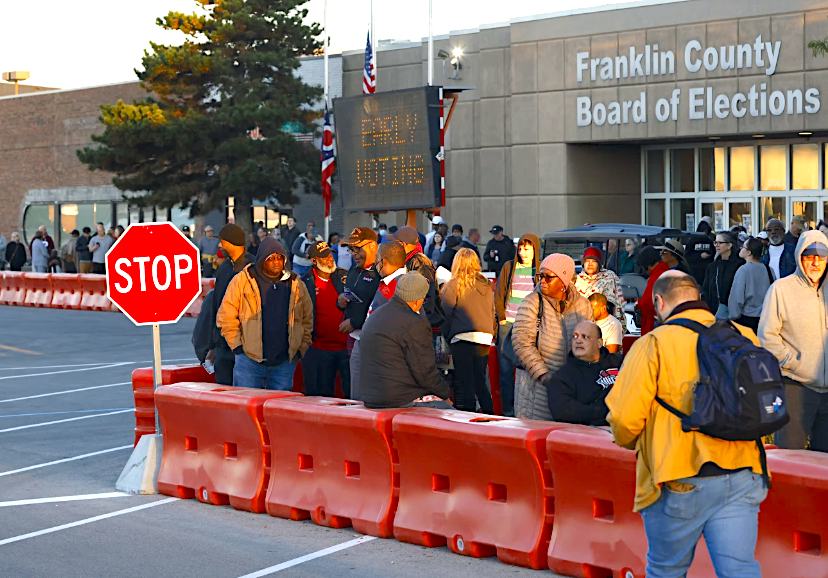Talk of election falsehoods died down after President-elect Donald Trump won, thanks in part to Vice President Kamala Harris’s relatively prompt concession. It was Trump’s side that had been prepared to mount claims of fraud if he had lost, and that proved unnecessary.
The Washington Post
It’s been the biggest year for elections in human history: 2024 is a “super-cycle” year in which 3.7 billion eligible voters in 72 countries had the chance to go the polls. These are also the first AI elections.
The Conversation
Stanford Communication professor Jeff Hancock, an expert on technology and misinformation, has been accused of using artificial intelligence (AI) to craft a court statement.
The Stanford Daily
Spanish-speaking communities in the United States are uniquely vulnerable to the unmitigated spread of election misinformation. These communities face risks other communities do not: misinformation often exploits their unique socio-political experiences.
Brennan Center for Justice
As digital information grows more pervasive, business leaders and educators face a critical challenge: How can they help individuals discern fact from fiction in a world awash with falsehoods?.
Forbes
Local journalism is a dying profession. Since the start of the 2000s over one-third of the country’s newspapers and two-thirds of its journalists have been lost according to a study from Northwestern University’s Medill School of Journalism.
West Potomac Wire
Nadya Bliss, the executive director of Arizona State University’s Global Security Initiative, helps us understand disinformation from the ground up.
American Diplomat
Violent confrontations between Chinese and Philippine vessels in the South China Sea are being manipulated online by disinformation networks for profit, posing risks to regional security, an AFP investigation has found.
Agence France-Presse
At the start of the year, there were widespread concerns about how generative AI could be used to interfere in global elections to spread propaganda and disinformation. Fast-forward to the end of the year, Meta claims those fears did not play out, at least on its platforms.
TechCrunch
Australian lawmakers on Thursday approved a landmark ban on social media for children under 16, in some of the world’s toughest such controls. The ban aims to address the impact of social media use on children’s physical and mental health.
NBC News
The UK is facing a “grim” world of “two tier” journalism, in which access to high-quality information is reserved for the few, with increasing numbers relying solely on dangerously unreliable online sources for their news, according to a new Parliamentary report.
Byline Times
Australia’s federal government’s proposed legislation on misinformation and disinformation has passed the House of Representatives, but faces a rocky time in the Senate. Opponents have dubbed it the MAD Bill, and it has certainly made some of them mad. Ironically, there is a great deal of misinformation circulating about the bill itself.
The Conversation
In the wake of a divisive election cycle full of misinformation, many families will be sitting down at the Thanksgiving table with loved ones who may not see eye-to-eye. In North Salem, New York, a seventh-grade media literacy class has been preparing for that challenge by learning how to have difficult but empathetic conversations.
CBS News
Misleading and false climate content surging through social media and other channels threatens the COP29 climate talks by undermining science-based policy decisions, United Nations officials said.
Inside Climate News
Rutgers University is launching a ‘Democracy Lab’ to promote civil discourse and political participation, school officials announced Friday. The lab, based at the Eagleton Institute of Politics in New Brunswick, is designed to help students recognize disinformation, engage effectively with people who hold different views, and tackle the challenges facing American democracy.
Newark Star-Ledger / NJ.com
Misinformation can lead to socially detrimental behavior, which makes finding ways to combat its effects a matter of crucial public concern. A new paper by researchers at the Annenberg Public Policy Center in the Journal of Experimental Psychology: General explores an innovative approach to countering the impact of factually incorrect information called ‘bypassing.’
Annenberg Public Policy Center of the University of Pennsylvania
When Ephrem Yalike-Ngonzo was first approached in 2019 by a Russian who suggested he help promote the activities of the Central African Republic’s army and Russian forces in the country, the journalist believed that he was doing the right thing.
The Associated Press
In the heat of the 2024 election, news influencers seemed to be everywhere. Both Republicans and Democrats credentialed content creators to cover their conventions – and encouraged influencers to share their political messages. Influencers also interviewed the candidates and held fundraisers for them.
Pew/Knight Initiative
It’s not just your coworker or socially awkward uncle who is now prone to believe the earth is flat or in the existence of a deep state: A new survey from the nonprofit the News Literacy Project found that 81% of teens believe at least one conspiracy theory.
Pittsburgh Post-Gazette
An overwhelming majority of teens (94%) say that schools should be required to teach media literacy, a new study by NLP shows. A full 57% offer strong support, saying schools should “definitely” have such a requirement, and another 36% offer some support, saying schools should have a requirement in some cases.
News Literacy Project




















